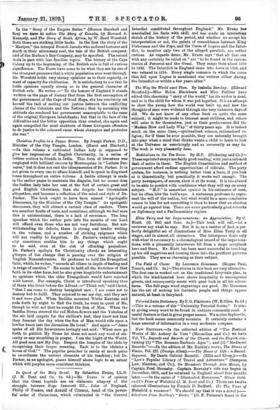Christian Profiles in a Pagan Mirror. By Joseph Parker, D.D.,
Minister of the City Temple, London. (Hurst and Blackett.) —In this volume a cultivated Indian lady is supposed to give her impressions of English Christianity, in a series of letters written to friends in India. This form of literature was employed with brilliant success by Montesquieu in "Lettres Per- sanes," but it does not suit the idiosyncrasies of Dr. Parker. It is not given to every one to efface himself, and to speak in disguised tones throughout an entire volume. A feeble attempt is made in the earlier pages to maintain the disguise, but no sooner does the Indian lady take her seat at the feet of certain great and good English Christians, than she forgets her Orientalism altogether, and becomes a reflection of the mind and style of Dr. Parker. The book ought to have been named " Apologetic Discourses, by the Minister of the City Temple." As apologetic discourses, they will attract a certain class of readers. There are manifest faults of taste, and sometimes, although we feel sure this is unintentional, there is a lack of reverence. The long speeches which the author puts into the mouths of our Lord will offend even those who are not very fastidious. But not- withstanding its defects, there is strong and tender writing in the volume, and a number of striking epigrams which will not readily be forgotten. Dr. Parker's unfailing auda- city sometimes enables him to say things which ought to be said, even at the risk of offending prejudices. Dr. Parker's apologia for Christianity affords an interesting glimpse of the change that is passing over the religion of English Nonconformists. He professes to hold the Evangelical faith, which, he writes, "exceeds all others in depth of feeling and in range of emotion." He seems to hold all the doctrines of that faith in its older form, but he also gives hospitable entertainment to opinions which the older Evangelicals would have rejected with horror. For example, Christ is introduced speaking thus of those who lived before the Advent :—" Think not," said Christ, "that I am come to destroy benighted men : I am come not to destroy but to fulfil. They rejoiced to see my day, and they saw it and were glad. When Buddha mounted White Kantaka and rode forth by night to find the truth, he went in quest of Me, though he wist not that he sought the Son of Man. When the Saddha Doves strewed the red Mohra-flowers and the Yakshas of the air laid carpets for the stallion's feet, they knew not that they forecast the day when the Son of Man would ride upon a lowlier beast into the Jerusalem He loved." And again :—" Jesus spake of all His forerunners lovingly and said : When men go forth to publish My Name let them not mock any word of sin- cerity or any stumbling in prayer. I am the Light of the World. All good men saw My Day. Respect the temples of the idols by recognising their larger meaning. Each is to the idolator a house of God." The popular preacher is rarely at much pains to co-ordinate the various elements of his teaching; but Dr. Parker, as an apologist, places himself above logic to an extent which will perplex more consistent thinkers.


































 Previous page
Previous page